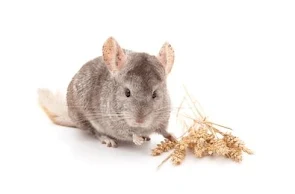The Ultimate Guide to Chinchillas: Care, Diet, Habitat, and More
Chinchillas are adorable, fluffy rodents that have captured the hearts of pet lovers worldwide. Known for their soft fur, playful personalities, and unique behaviors, these small mammals make excellent pets for the right owners. If you're considering adopting a chinchilla or simply want to learn more about them, this comprehensive guide covers everything you need to know chinchilla care, diet, habitat, lifespan, cost, and common health issues based on the most searched keywords.
1. What Is a Chinchilla?
Chinchillas (Chinchilla lanigera and Chinchilla chinchilla) are native to the Andes Mountains in South America. They are highly social, intelligent, and active creatures, primarily nocturnal. Due to excessive hunting for their ultra-soft fur, wild chinchillas are now endangered, but domesticated chinchillas thrive as pets when given proper care.
Key Facts About Chinchillas
Lifespan: 10–20 years (one of the longest-living small pets)
Size: 9–15 inches long (plus a 3–6 inch tail)
Weight: 1–1.5 lbs
Fur: Extremely dense (up to 60 hairs per follicle)
Behavior: Social, active, loves jumping and climbing
2. Chinchilla Care: Habitat and Environment
One of the most searched topics is "chinchilla cage setup" and "chinchilla habitat requirements." These animals need a spacious, safe, and stimulating environment.
Ideal Chinchilla Cage Setup
Size: Minimum 3' x 2' x 2' (bigger is better)
Material: Metal wire with solid flooring (avoid plastic)
Bedding: Kiln-dried pine or aspen shavings (avoid cedar)
Toys & Accessories:
Wooden ledges & platforms
Chew toys (chinchillas need to grind their teeth)
Dust bath house (essential for fur health)
Hideouts & tunnels
Temperature: Keep between 60–75°F (they overheat easily)
Do Chinchillas Need a Companion?
Chinchillas are social but can be territorial. Pairing two chinchillas (same sex or neutered pairs) is ideal, but introductions must be gradual.
3. Chinchilla Diet: What Do They Eat?
A proper chinchilla diet is crucial for their health. Many owners search for "what can chinchillas eat" and "chinchilla food list."
Best Foods for Chinchillas
Primary Diet: High-quality timothy hay (unlimited supply)
Pellets: Specially formulated chinchilla pellets (avoid mixes with seeds/nuts)
Treats (in moderation):
Dried rose hips
Plain oats
Dandelion leaves
Small apple or carrot pieces (rarely)
Foods to Avoid
High-sugar fruits
Nuts & seeds (too fatty)
Lettuce (can cause bloating)
Dairy or meat products
4. Chinchilla Health & Common Problems
Searches like "chinchilla health issues" and "chinchilla lifespan" indicate that owners want to ensure their pets stay healthy.
Common Chinchilla Health Problems
Dental Issues: Overgrown teeth (provide chew toys)
Heat Stroke: They cannot sweat keep them cool!
Fur Fungus (Ringworm): Caused by humidity; treat with vet-prescribed antifungals
GI Stasis: Lack of fiber can cause deadly blockages
Bloat: From improper diet
Signs of a Healthy Chinchilla
Bright, clear eyes
Clean ears and nose
Consistent eating & drinking
Active and curious behavior
5. Chinchilla Cost: Price & Expenses
Many prospective owners search for "how much does a chinchilla cost?" Here’s a breakdown:
Initial Costs
Chinchilla Price: 300 (depending on color/breed)
Cage: 300
Accessories: 150
Monthly Costs
Food (hay & pellets): 40
Bedding & Dust Bath: 25
Vet Visits (annual checkup): 100
6. Chinchilla Behavior & Fun Facts
They take dust baths (never water baths it ruins their fur!)
They can jump up to 6 feet!
Chinchillas communicate with chirps, barks, and squeaks
They shed fur in patches when stressed ("fur slip")
Final Thoughts: Are Chinchillas Good Pets?
Chinchillas are wonderful pets for experienced owners who can provide proper care, a cool environment, and long-term commitment. They’re not ideal for young children due to their fragility and sensitivity.By following this guide covering chinchilla care, diet, habitat, health, and cost you’ll be well-prepared to give your chinchilla a happy, healthy life!







